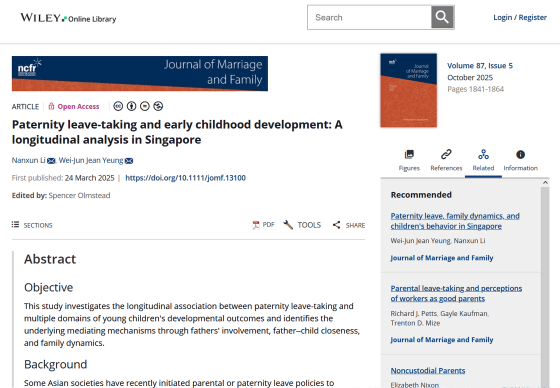Research shows that fathers taking more than two weeks of parental leave improves children's development

In recent years, it has become easier for both mothers and fathers to take parental leave. A study conducted in Singapore found that fathers taking parental leave of two weeks or more leads to improved child development.
Paternity leave‐taking and early childhood development: A longitudinal analysis in Singapore - Li - 2025 - Journal of Marriage and Family - Wiley Online Library

Two weeks of paternity leave linked to improved child development
https://www.psypost.org/two-weeks-of-paternity-leave-linked-to-improved-child-development/
Previous research has shown that paternity leave is associated with increased participation in childcare and stronger family bonds, but the impact of paternity leave on children's long-term development is not well understood.
In addition, many Asian countries have only recently introduced paternity leave, or have not introduced it at all, and in some countries it is only available for a few days. In Japan and South Korea, fathers are allowed to take paternity leave until their child turns one year old .
'Many Asian societies, including Singapore, are facing challenges from rising birth rates and gender inequality within the family,' said Professor Wei-Jun Jean Yeung of the National University of Singapore. 'Some Western countries, particularly those in Northern Europe, have introduced longer parental leave for decades to improve parents' work-life balance and encourage fathers to participate in childcare.'
Professor Yeung and his research team investigated the impact of paternity leave based on two theoretical perspectives: family systems theory and social capital theory .
Family systems theory is a theory that states that families function as connected units, and that family actions and experiences, such as fathers' involvement in childcare, influence children's development and the relationships between parents. Social capital theory also proposes that strong relationships and bonds within families, such as those between parents and children, have a positive impact on children's development.

The research team used data from
The Behavior Problem Inventory (BPI) was used to measure child development, assessing both external behaviors such as aggression and internal behaviors such as anxiety. Academic achievement was assessed using a letter and word identification test and applied questions measuring numeracy from the Woodcock-Johnson Achievement Tests .
The key independent variable was 'father's parental leave use,' which was classified as 'father took no parental leave at all,' 'father took one week of parental leave,' or 'father took two weeks or more of parental leave' based on mothers' reports. Additionally, information on the father's involvement in childcare activities such as bathing, changing diapers, and playing, as well as the level of intimacy between father and child, was also collected from mothers.
The analysis showed that fathers taking two weeks or more of parental leave was associated with improved letter and word identification scores in children aged 3 to 6 and 5 to 8. A positive correlation was also confirmed between fathers taking two weeks or more of parental leave and improved scores in children aged 3 to 6 on applied questions measuring numerical thinking ability. It was also reported that fathers taking one week of parental leave was associated with improved scores in children aged 5 to 8 on applied questions. These results indicate that fathers taking parental leave is associated with the development of children's language and numerical thinking skills.

It has also been found that there are various correlations between fathers' taking parental leave and various intermediate factors. Specifically, taking parental leave of two weeks or more was associated with fathers' involvement in childcare, high levels of intimacy between father and child, and a good home environment. High levels of intimacy between fathers and children were also associated with scores on applied questions measuring the mathematical thinking ability of children aged 3 to 6.
On the other hand, while fathers' parental leave did not have a direct effect on children's behavior, an effect via intermediate factors was confirmed. Fathers' parental leave of two weeks or more was associated with a decrease in behavioral problems in children aged 3 to 6 and 5 to 8, but this was mainly due to 'improved family relationships.' In other words, fathers' parental leave fosters a positive family environment, which in turn reduces children's behavioral problems.
Regarding research on paternity leave, some researchers have pointed out that 'fathers who take parental leave tend to have higher socioeconomic status, which may affect their children's cognitive abilities and behavior.' To address this issue, the research team took into account various factors, such as parents' education, income, age, and family environment.
'Paternity leave has a positive impact on family relationships and child development,' Yeung told psychology publication PsyPost. 'Given the potential benefits to family and child well-being, countries should encourage fathers to take parental leave by offering at least two weeks of government-subsidized leave.'
Related Posts:
in Science, Posted by log1h_ik







